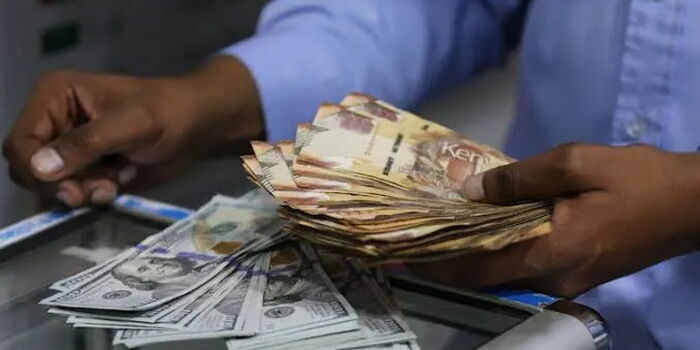Kenyan Shilling Defies Odds, Gains 21% Against US Dollar

The Kenyan shilling has maintained a firm stance against the US dollar, providing much-needed relief on the cost of imports.
Why it matters: This strength could signal a positive shift for the economy, particularly in lowering the price of raw materials and finished goods which has been a significant burden for businesses across the country.
Dig deeper: On Wednesday, the shilling traded at Ksh128.50/129.50 per dollar, holding steady from the previous day. Currency experts anticipate that this trend may continue bolstered by increased dollar inflows from tea exporters.
Traders pointed to a possible further strengthening of the shilling, which has already staged a remarkable recovery this year, making it one of the best-performing currencies globally.
A man counting several one thousand Kenyan shillings bills.
Photo
Wilberforce Okwiri
Data from Financial Fortune shows that the shilling, which had previously been one of the worst-performing currencies, has now appreciated by 21 per cent against the dollar in 2024. The currency hit a ceiling of Ksh129.19 to the dollar through most of September, a huge improvement that has surprised many in financial circles.
If the shilling sustains its current course, Kenya could see a drop in the cost of key imports like fuel and cooking oil, providing much-needed relief to consumers who have been struggling with high inflation rates.
Experts have linked the shilling’s stability to the Central Bank of Kenya’s (CBK) recent strategic moves to maintain foreign exchange reserves and manage market volatility. These interventions have allowed the CBK to shore up its reserves, which now stand at $8.03 billion, enough to cover 4.1 months of imports.
Central Bank’s involvement, however, has sparked debate among traders. Some argue that the shilling could have appreciated even further had the CBK stayed out of the market. “The CBK’s dollar-buying has kept the shilling from gaining more ground,” remarked one trader. Despite this, the CBK has remained firm, clarifying that it has no preferred level for the currency and only steps in to curb volatility.
Prime Cabinet Secretary Musalia Mudavadi reinforced the positive outlook, stating that increased foreign remittances have bolstered Kenya’s balance of payments, aiding in stabilising the shilling. This is a welcome development for an economy that has been under external pressure for much of the last year.
The shilling’s stability comes despite a recent interest rate reduction by the US Federal Reserve. While such global financial moves usually affect frontier and emerging market currencies, Kenya has defied expectations. The CBK’s ability to manage external pressures, particularly through boosting foreign reserves, has played a critical role in shielding the currency from broader economic shocks.
Nevertheless, September saw a narrowing in the shilling’s trading range, fluctuating only slightly between Ksh129.30 and Ksh129.17. This period of low volatility and reduced trading margins resulted in a quieter forex market overall, but experts remain optimistic about the shilling’s future trajectory.
The year-to-date performance of the shilling marks a major turnaround from its dismal showing in 2023, when it plunged to Ksh160 to the dollar. This prompted emergency measures by the CBK, including raising the base rate to 13 per cent, aimed at attracting more dollar inflows into Kenya’s debt market. The recovery has been swift, and now the shilling is among the top-performing currencies on the African continent.
Bigger picture: The central bank’s interventions, including its management of forex reserves and recalibration of the local debt market, have been crucial to this recovery. As global economic conditions continue to shift, particularly with the prospect of further reductions in US interest rates, the CBK’s careful handling of the shilling will be key to ensuring that Kenya remains on solid financial footing.
Looking ahead, the Kenyan market could see more inflows, further strengthening the shilling. However, the CBK must tread cautiously, as over-appreciation could make Kenyan exports less competitive in the global market, potentially harming the broader economy.
SGR Cargo train on the move.
File



